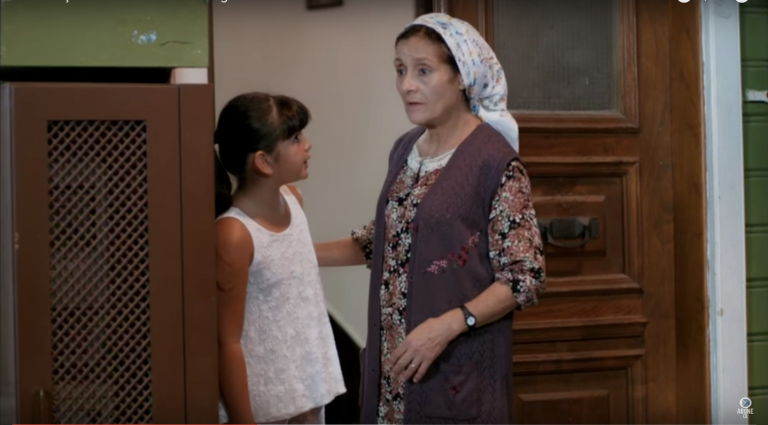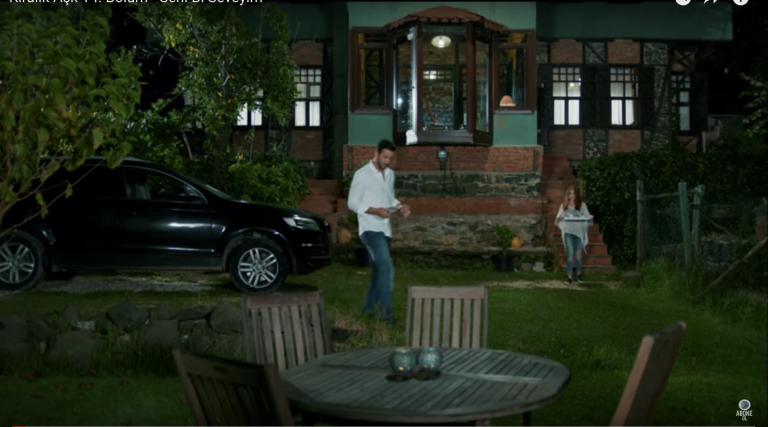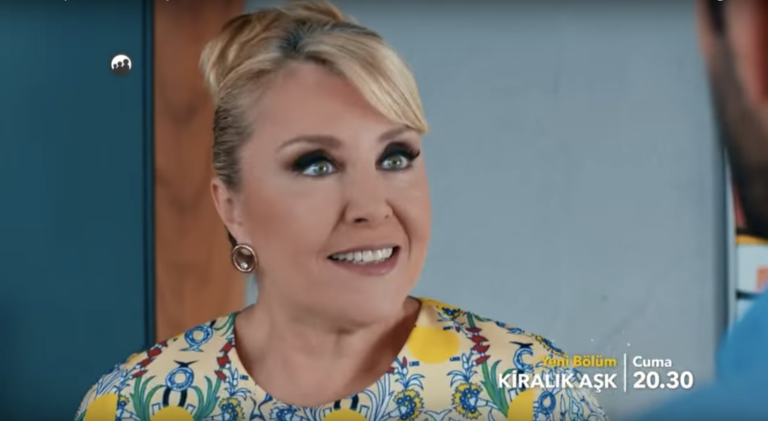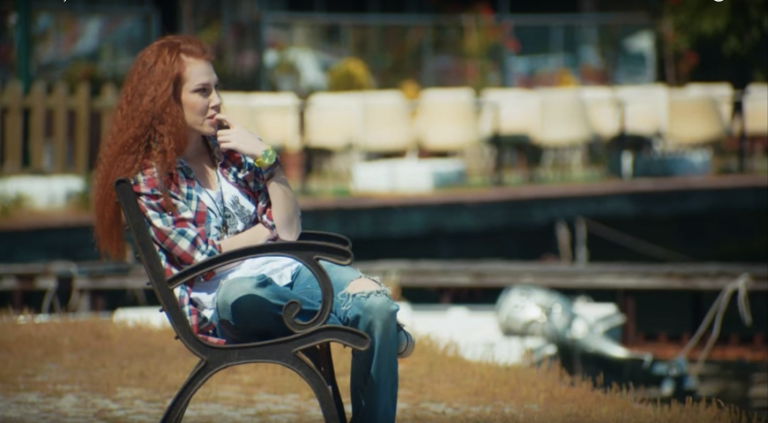Click “watch on YouTube” if you prefer a visual introduction to the show’s plot!
As you probably know by now (if you’ve read my previous posts), I’m a voracious viewer. I watch documentaries, short docu-videos, TV shows, movies, whatever I can get my hands on, really. This week I’m going to talk about social stratification and vertical social mobility as seen in Kiralık Aşk, a Turkish TV show and critique it based on what we have learned in class so far. The show spans two seasons (that’s 69 episodes), but I’ll only cover the relevant points here.
Kiralık Aşk, which directly translates to Love For Rent, is about a girl named Defne who is in the working poor class. She lives with her brother, sister and grandmother. In order to pay off her brother’s 200,000 lira debt, she accepts an offer from Ömer’s aunt, sneaky Neriman, to participate in a love game where she is to marry Ömer, a young, good-looking businessman. Did I mention that he’s rich? Do you see where this is going? Her goal is to make Ömer fall in love with her and then leave him. If she can do this, she earns her 200,000 liras. This way, Neriman will obtain all of the family riches.
WELL. Defne starts working as his assistant and things do not go as Neriman planned. SPOILER ALERT: Ömer falls in love with Defne-mission accomplished-but, Defne falls in love with him too. Long story short, she starts working as his assistant as part of the game, but Ömer eventually gives her a position as a designer and she later starts her own design company. She becomes equally as successful as Ömer. The game dissolves and love conquers all.



This is a good example of vertical social mobility as Defne starts as in the lower class and ends up in the upper class. It happens as intragenerational mobility-during her lifetime. Turkey’s social mobility is a fairly open system with access to education and resources, but I think Defne’s upward movement from poor to the top 1% is pretty extreme… even by United States standards.
Ömer has property, power and prestige. His property consists of his beautiful home and a huge weekend house in Istanbul’s countryside where he goes to relax. He is respected and treated honorably as his company’s boss, even by his business partner, Sinan, so he has prestige. He has power because he can enact his will; for instance, he tells his employees what he wants them to do and his driver is by his side when he wants to go from point A to point B .


As a working poor, Defne did not have any property that belonged to her (her house was her Grandmother’s property), so she doesn’t have wealth in the beginning of the series. She did not have any sort of power as a waitress because she can’t enact her will; people don’t listen to what she has to say and she just follows orders. She also didn’t have prestige and often was ordered around and treated unfairly at the restaurant. No wonder she didn’t like the job. She didn’t pursue higher education after high school because of financial constraints, which is another characteristic of the pink collar class. Had it not been for Ömer, I thinks Defne would have reproduced the social class of her family because it would have been pretty hard for her to obtain upper class status without the social capital she gained as a result of meeting Ömer. Furthermore, Neriman wasn’t initially part of Defne’s social capital when she was offered a part in the love game. They met by chance in Istanbul when she made the offer right then and there.
Also, the show touches on family units. A family is a social institution and can consist of many different people and it doesn’t have to be just a mom, a dad and kids. Defne, for instance, lives with her siblings and her grandmother, Ömer lives alone and Neriman lives with her husband.

As a result of her vertical social mobility, Defne now has economic capital. She is able to buy a home together with Ömer and her cultural capital expands as well. For example, she goes to shoe designers’ launches, plays golf, attends prestigious awards ceremonies (where Ömer gets awarded for his shoe designing business), and uses designer bags-objects and events she didn’t know about in her previous bubble of life.

Fun fact-Ömer actually comes from a rich family but rejected his family’s wealth and built a successful business on his own through working hard. He may have used the social capital he gained from his family and prestigious university, but certainly didn’t have the economic capital he could have used. So, he experiences downward vertical social mobility when he cuts himself off from his family and then moves upwards after becoming rich after forming his shoe business. His story is also one of meritocracy- the idea that with hard work, success will follow and that mobility is based on an individual’s ability.
Let’s talk about some sociological critiques. I think the show reinforces stereotypes of certain classes. For example, Neriman, who only cares about her financial gains from the love game, is portrayed as a snobby rich woman. She’s eclectic and will do whatever it takes to earn more money. Defne is poor but proud and is a hard worker. In Turkish, this stereotype is labled as fakir ama gururlu (literally, poor but proud). Gender roles are also reinforced by Love for Rent. I don’t think this was the show’s primary purpose as they probably just wanted to tell a love story, but Ömer basically saves her from her poor status. It’s like a Cinderella story where a man comes to save a helpless girl because he loves her. I don’t think girls should be waiting around for a man to come and save them. Although, I did like the fact that she became her boss and had her own empire to run which showed that women can occupy the same occupational roles as men.


To prepare for her job as Ömer’s assistant, Defne reads his favorite books and watches his favorite movies to fit into his life. I think we can classy this as an attempt to pass as someone of upperclass rank.
In case you are curious, I found the first episode with English subtitles. It’s a fun show to watch-definitely a love story with an interesting twist. What do you guys think about vertical transition; is it likely that many people will experience upward movement? What about downward mobility; do you think it’s easier to go down in social mobility rather than up?
Until next week…
All images are from Kiralik Ask’s YouTube channel

I really enjoyed reading your post, and am actually interested in watching the show. I think this is such a great example of vertical social mobility and you did a great job at explaining different aspects of how she got to where she is. I’m not sure if it is likely many people will experiences upward movement. I think it depends on the person and how hard he/she is willing to work for it. Knowing the right people has a lot to do with it as well. I would have to say that it is easier to move down than it is to move up because most of the time it takes more work to to move up in social class than it does to go down.
LikeLiked by 1 person
I think that this show sounds extremely interesting! I have never heard of it before, but I might watch the first episode that you linked on this post. I like how you explained social mobility through this show. I do not think that it is likely that many people will experience upward movement. I believe that this depends on the person. If they are hard working and want to get ahead in life, then they will probably move upward. Also, I do think that it is easier to move down in social mobility. It is much easier to spend your money, and land in a lower social class, than it is to make money and move up. It can take a long time to move up in social class.
LikeLiked by 1 person
Sounds like a great show! I would think that it is easier for a person to downgrade their social status than it is for them to raise their status. In order to decrease your social status, all you would have to do is stop doing is stop doing your social responsibilities and perform a role exit. Unlike a decrease in status, an increase in status involves both changing yourself and fighting against the part of society that kept you from rising in the first place.
LikeLiked by 1 person
Great post! I’ve seena few turkish dramas myself, so I very well might watch this, and at least recommend it to my friend who loves things like this. I think social mobility is greatly explained through this example, and it seems that it holds true that luck has a lot to do with it. I don’t know whether love would classify as luck, but even their meeting would fall under luck I suppose. It shows how hard work doesn’t always lead to upwards social mobility, but sometimes it’s just the social capital one’s exposed to.
And while you mention that Turkey has a fairly open system, I don’t really think that it contributed much to this case of social mobility. I think that social mobility usually stays the same throughout generations, but I’m not sure if downwards social mobility would be harder or easier than upwards social mobility. It’s a great question.
LikeLike
That’s so cool! I wonder which ones you’ve watched! Aren’t Turkish dramas so captivating? I definitely recommend this one; the characters are pretty funny and the storyline flows well. 🙂
LikeLike
Love it! I think it’s so funny how well you know all of these random shows, but it’s so cool. I think you did a great job analyzing this show based off of a sociological point of view!
LikeLike
Haha, thanks!
LikeLike
What a great post! I like how you so eloquently analyze television shows through a sociological lens. I think the critiques are very sound, and point out a larger issue in our entertainment in which gender roles/stereotypes are constantly reinforced. It is very rare to see an independent woman who isn’t portrayed as a the “damsel in distress” type. I do also believe that upward social mobility is a very difficult and rare thing to achieve for many, due to the impact that environment has on this process. Therefore, if our parents have a certain social standing, it is likely we will replicate them in that regard through social reproduction.
LikeLiked by 1 person
Thank you!
LikeLike
Interesting post. I think this show is a humorous take on class differences. It really doesn’t seem realistic that someone would walk up to someone else and offer them that much money to make them fall in love just so that person can keep a fancy house. However, the differences in Omer and Defne’s lifestyles are probably pretty accurate. For example, Omer is worried about his fitness and designs while Defne is stressing out about rent. People don’t experience upward mobility like this. I think downward mobility is probably more common then upward. Upward mobility depends on more luck than hard work and a long time while downward mobility could happen overnight after a crash in the economy.
LikeLiked by 1 person
Great post. Side-note: isn’t the main actress also in Kurt Seyit & Sura?
LikeLike
Thanks! and nope 🙂 The main actress in Kurt Seyit & Sura is Farah Zeynep: http://www.imdb.com/name/nm4198135/
LikeLike